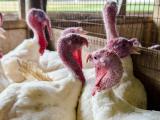Feb 11, 2005 (CIDRAP News) – The Thai government has announced plans to cull about 2.7 million free-range ducks to stem the spread of avian influenza, the Bangkok Post reported today.
Ducks have been found to shed high levels of the H5N1 virus without appearing ill. The national avian flu committee agreed in principle yesterday to cull free-range ducks, the newspaper reported.
More than a million adult ducks have been moved to farms or slaughterhouses, while another 5.5 million were confined to areas in northern and central provinces to be sold to the government, the Post reported.
The government’s measures will destroy a way of life for about 4,000 farmers but won’t control the spread of avian flu, Somnuek Promchaiwattana, leader of the Free-Range Duck Traders and Producers Club, told the Bangkok newspaper. Shifting to closed farming will cost more and force farmers to raise ten times as many ducks to realize a profit, he said.
The plan to cull ducks was announced less than a week after officials said hundreds of wild birds had died of avian flu in Thailand's central province of Nakhon Sawan.
Between Jan 18 and Feb 3, nearly 500 open-billed storks were found dead at the Boraphet reservoir, Thailand’s largest freshwater swamp, according to a story by the Chinese news service Xinhua on Feb 5.
Wildlife officials burned and disinfected areas where sick storks were found, the Bangkok Post reported on Feb 5, but officials stopped short of proposing a mass cull of the migratory birds.
The die-off bears a close resemblance to the deaths of more than 500 open-billed storks and 300 other birds in the same reservoir a year ago, according to the Xinhua report.
Thailand remains in the midst of widespread avian flu outbreaks in poultry. The country reported 10 new outbreaks in Phichit, PhitsanuLok, and Suphan Buri provinces in the last week to the World Organization for Animal Health (OIE). Twenty-eight other provinces are on avian flu watch, the Bangkok Post said today. More than 60,000 poultry have been culled in Thailand since early December, according to the country’s reports to OIE.
Unlike Vietnam, Thailand has not had any confirmed human cases of avian flu since October 2004.



















